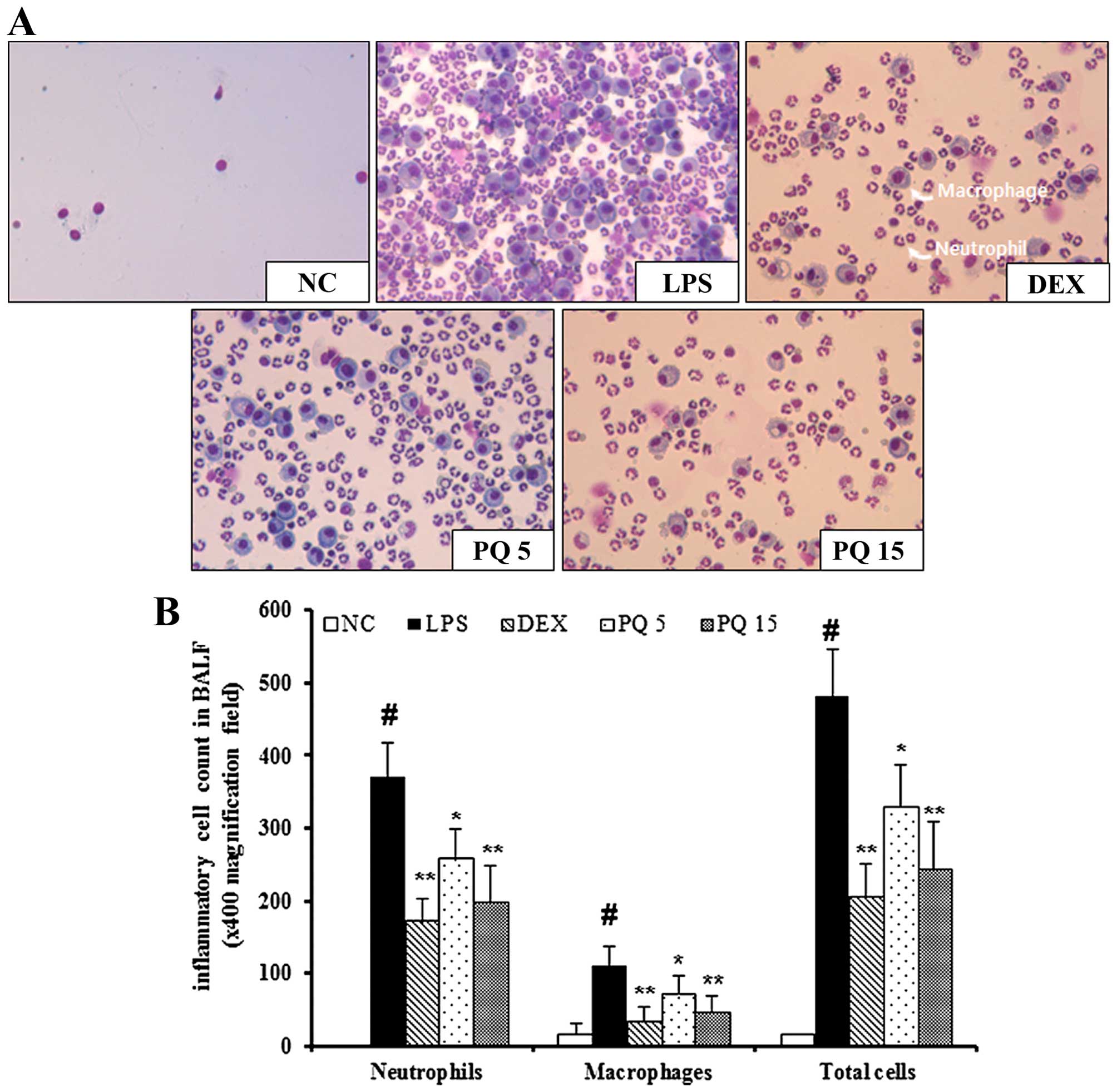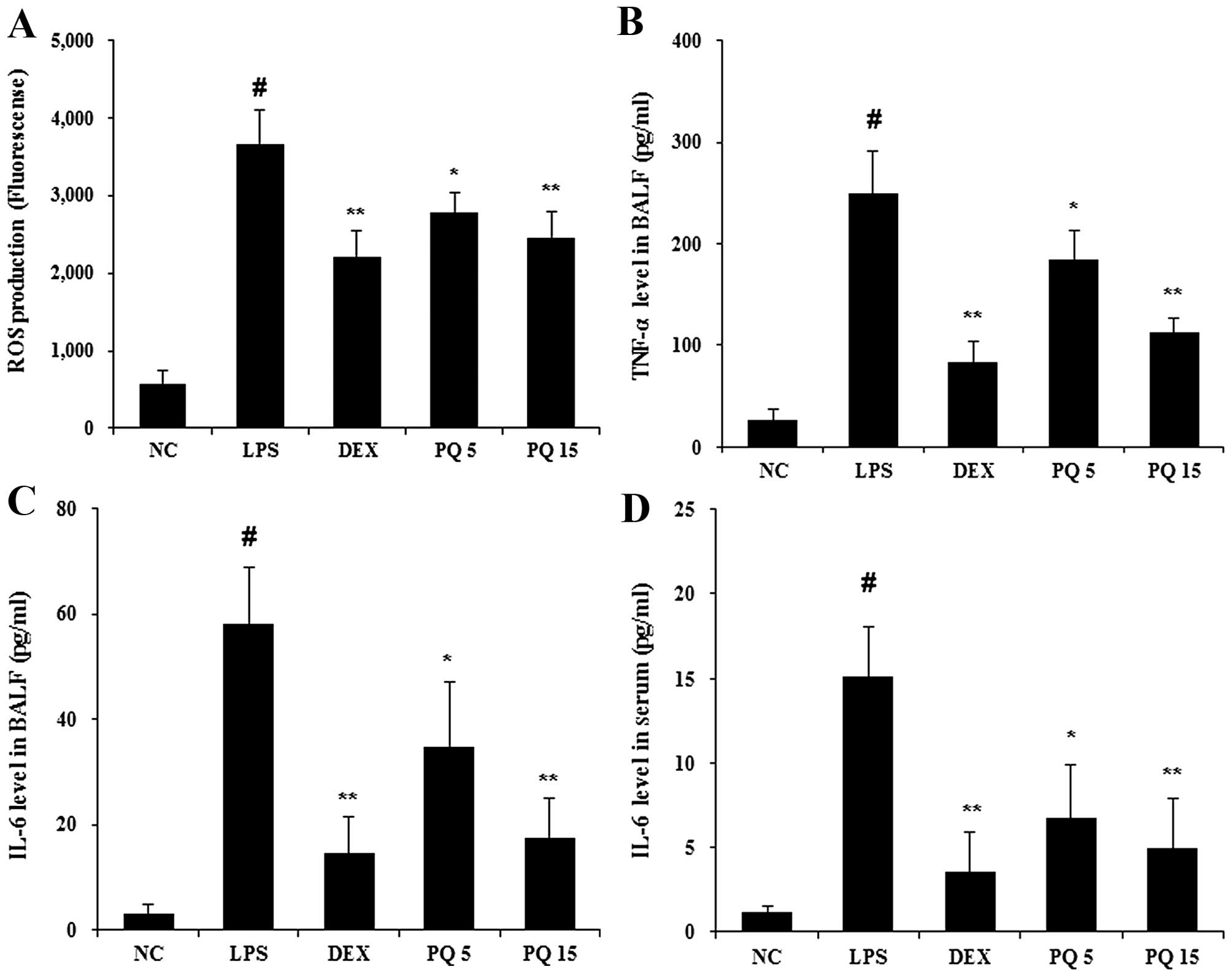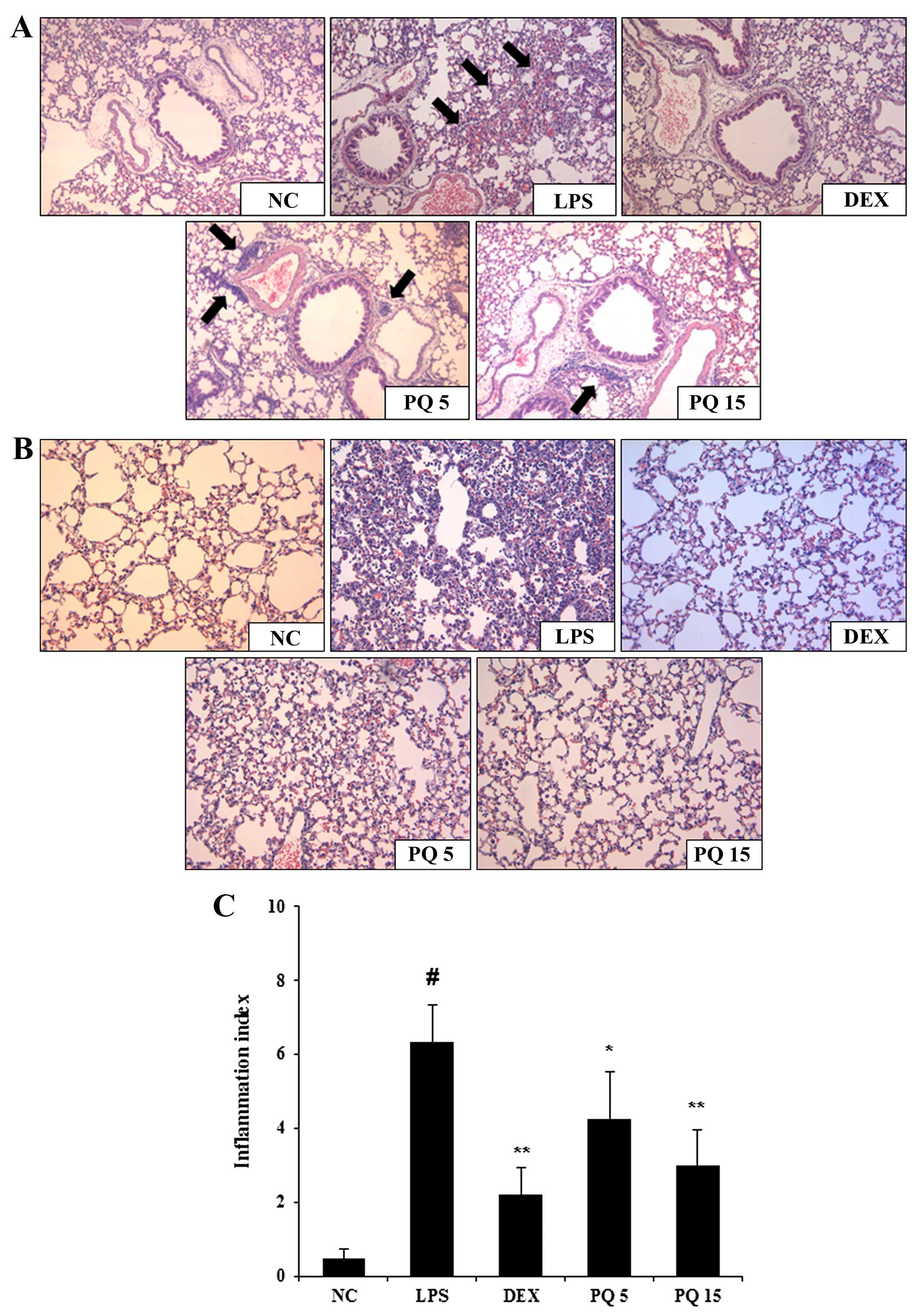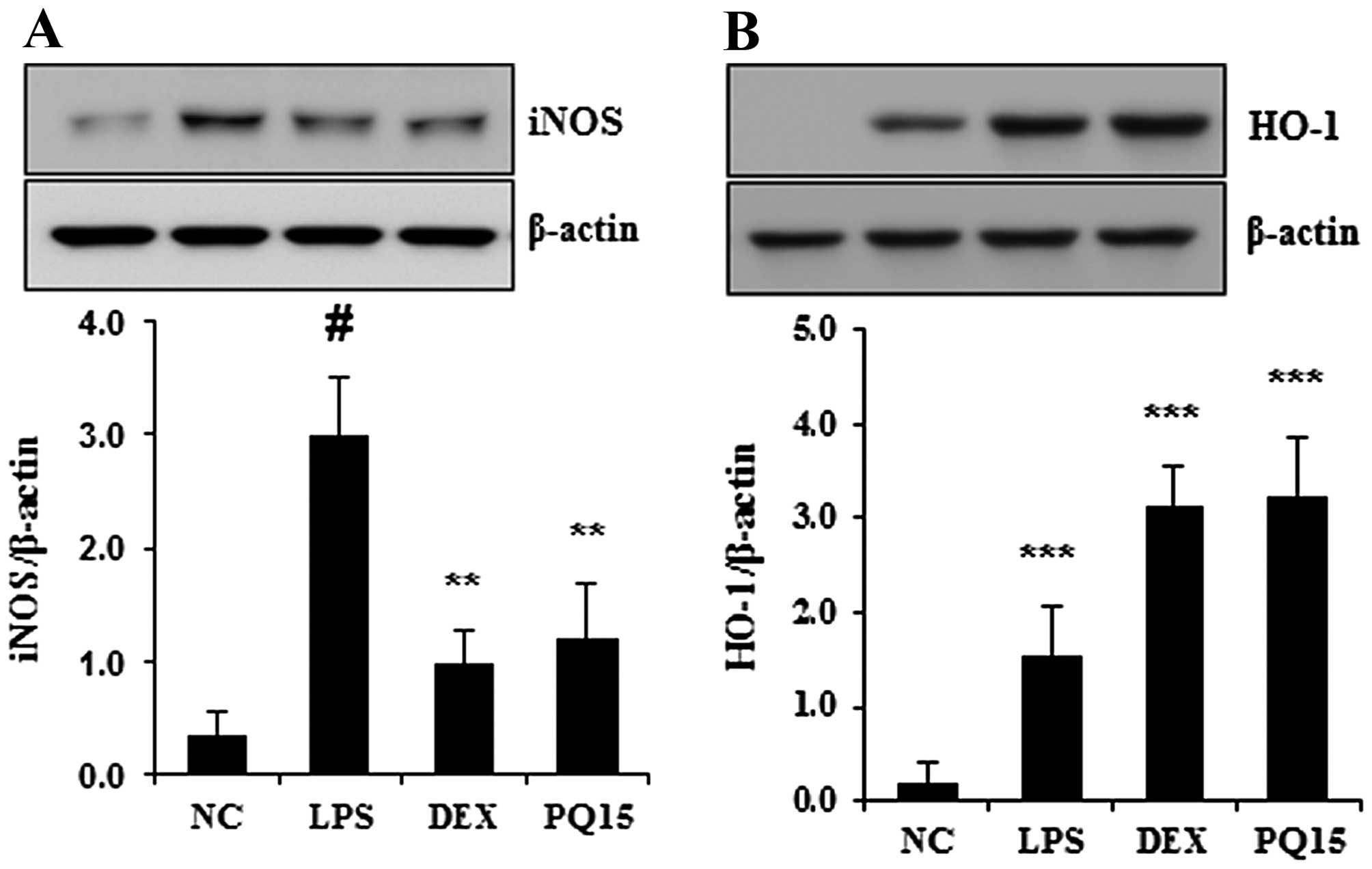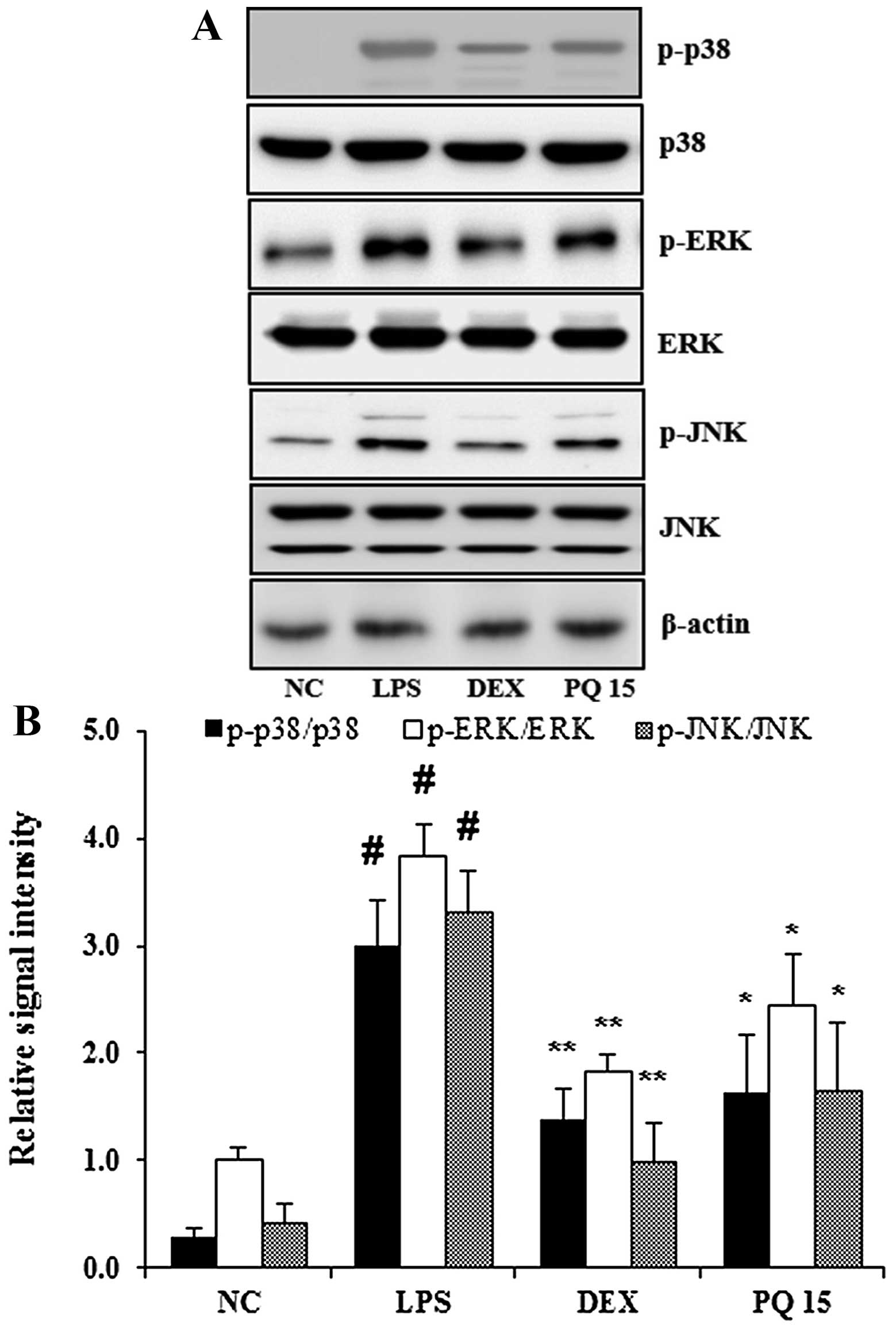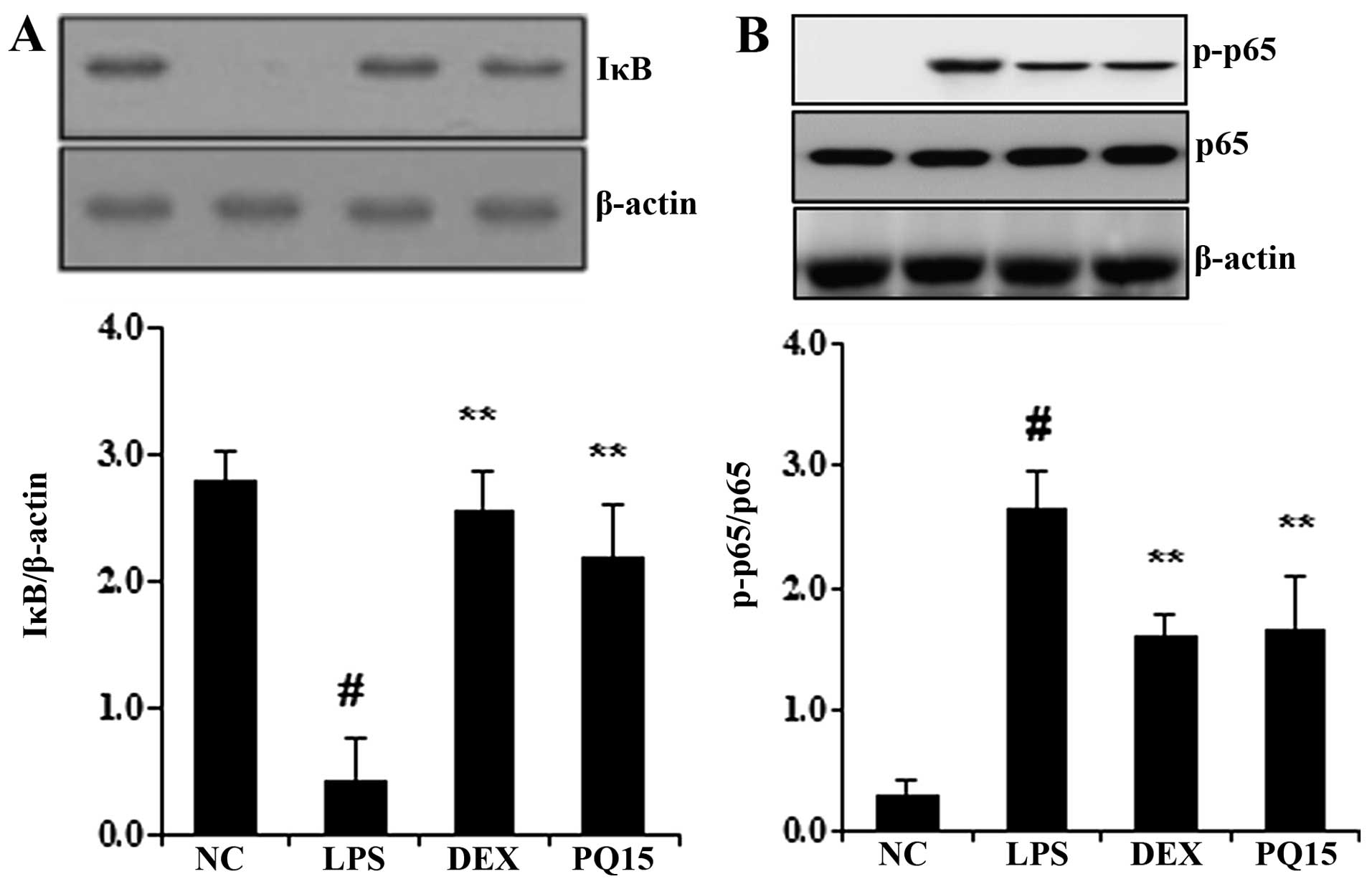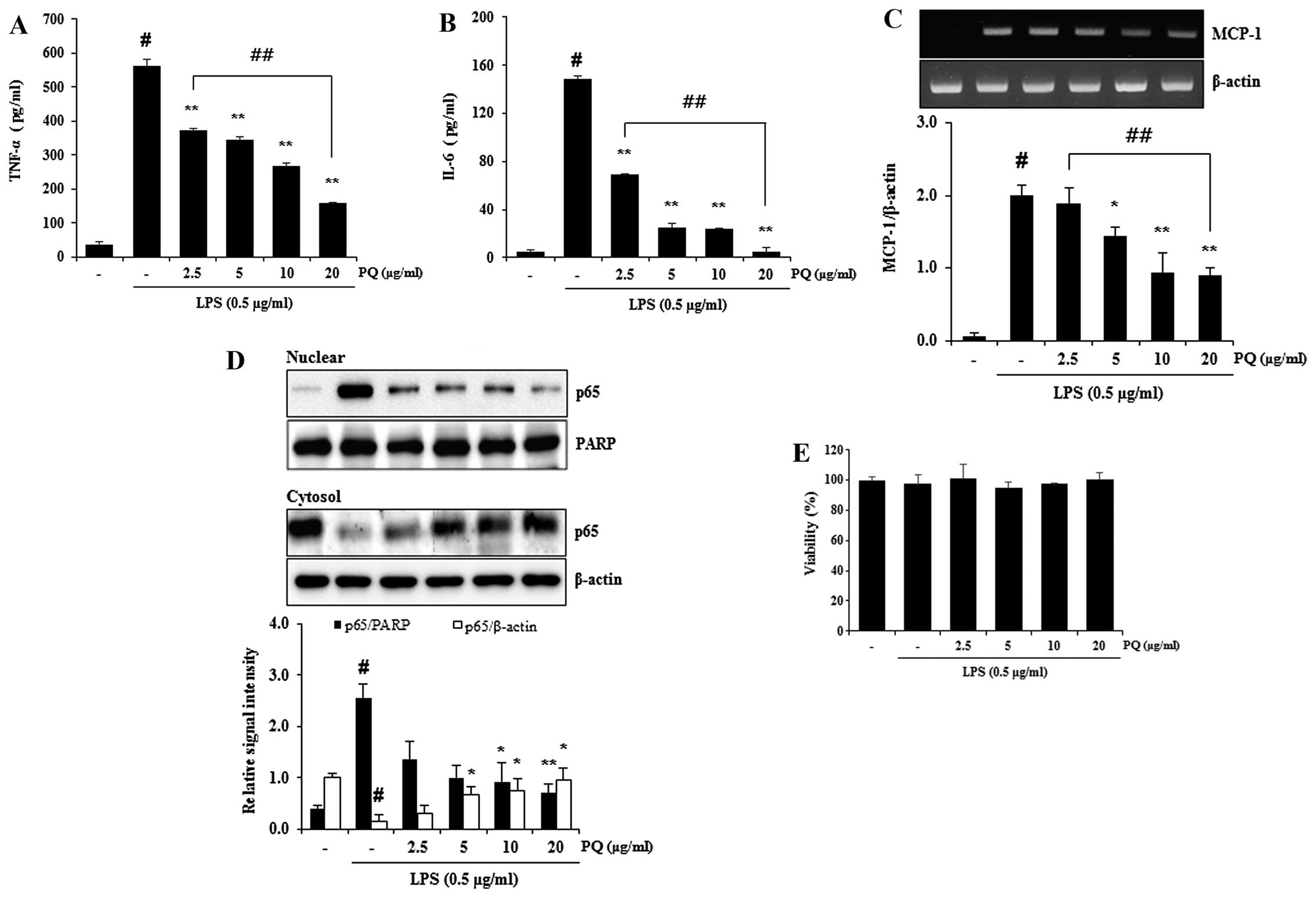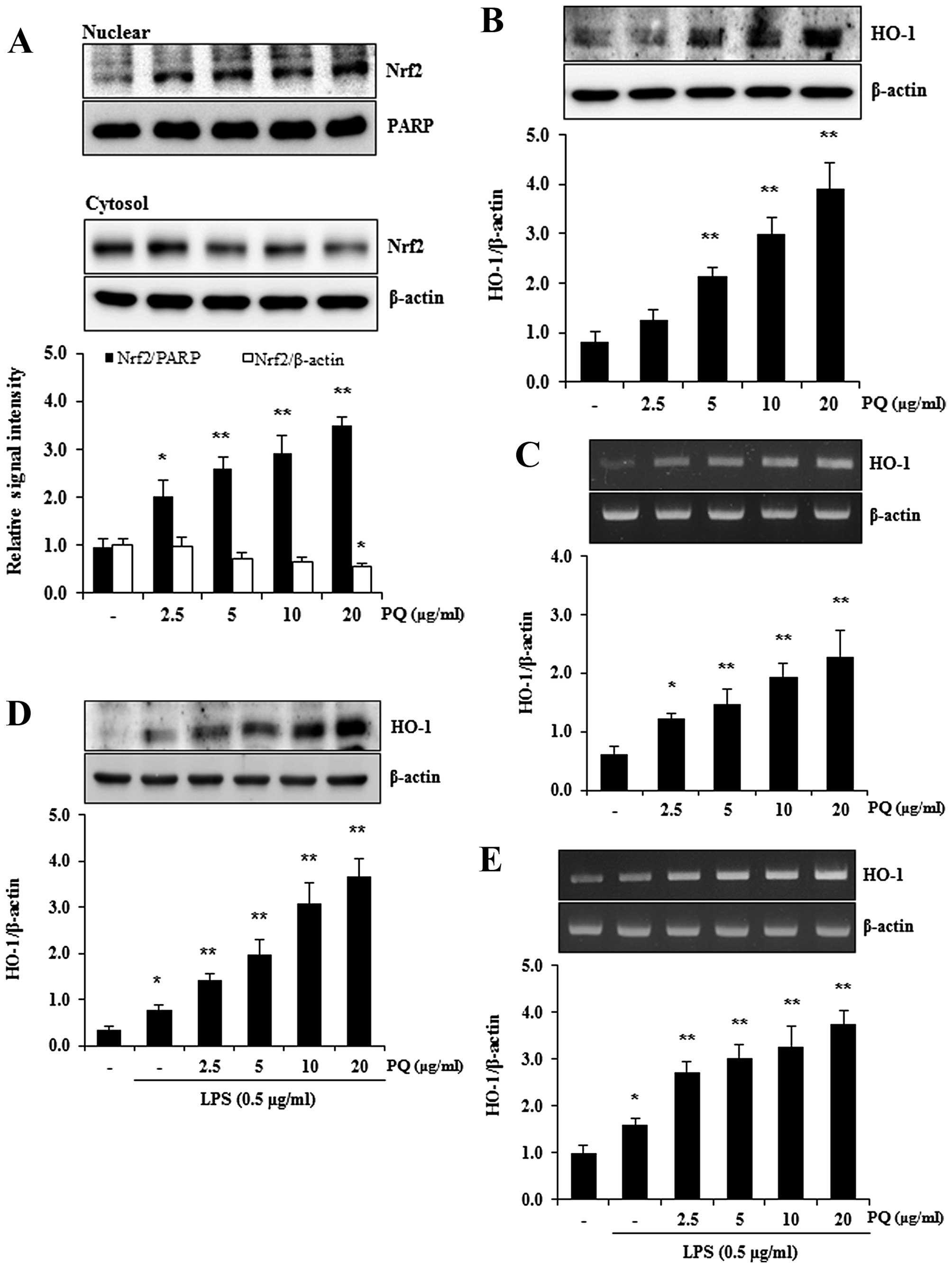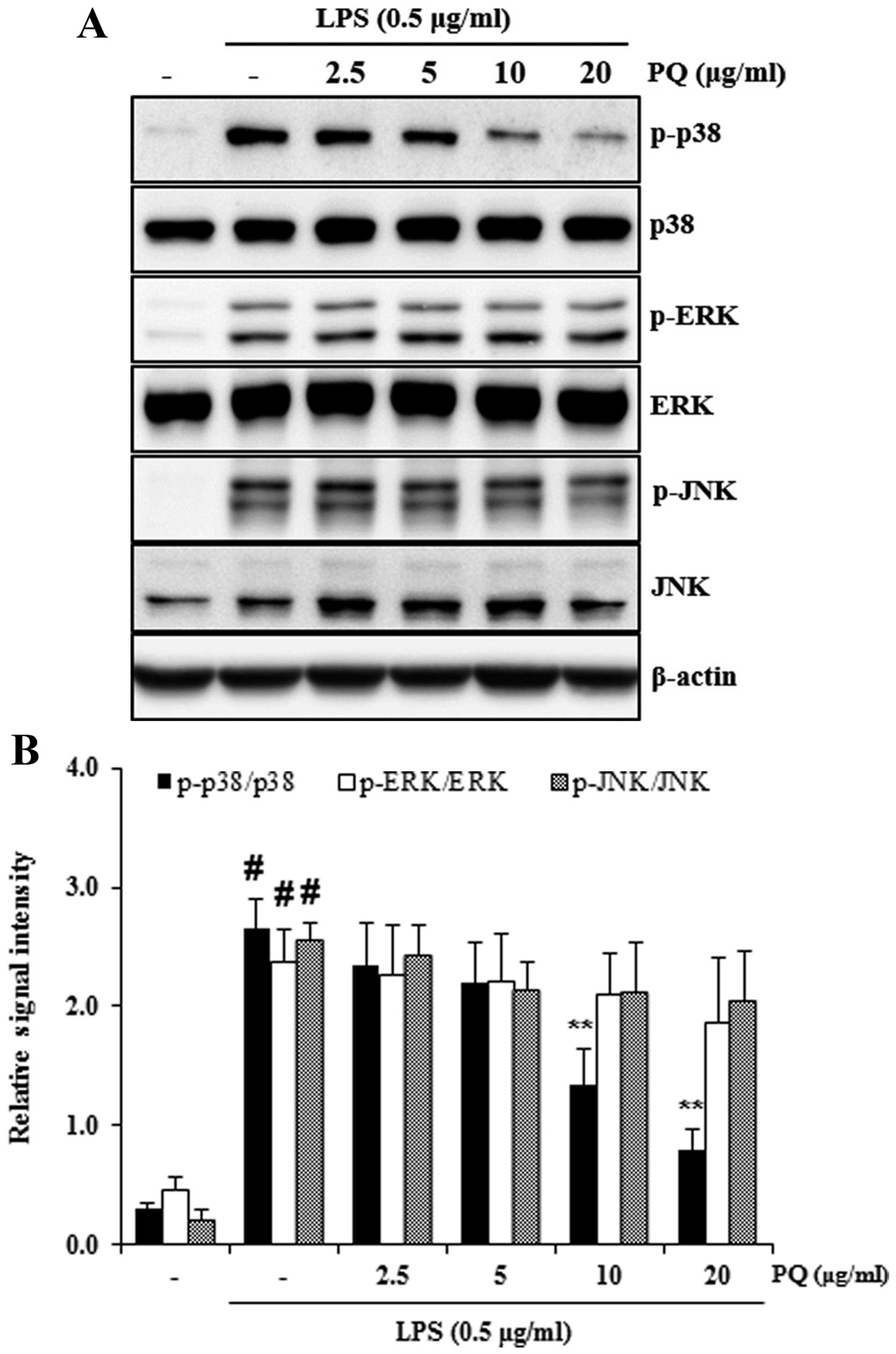|
1
|
Rubenfeld GD, Caldwell E, Peabody E,
Weaver J, Martin DP, Neff M, Stern EJ and Hudson LD: Incidence and
outcomes of acute lung injury. N Engl J Med. 353:1685–1693. 2005.
View Article : Google Scholar : PubMed/NCBI
|
|
2
|
Zhang Y, Liang D, Dong L, Ge X, Xu F, Chen
W, Dai Y, Li H, Zou P, Yang S and Liang G: Anti-inflammatory
effects of novel curcumin analogs in experimental acute lung
injury. Respir Res. 16:432015. View Article : Google Scholar :
|
|
3
|
Shin NR, Shin IS, Song HH, Hong JM, Kwon
OK, Jeon CM, Kim JH, Lee SW, Lee JK, Jin H, et al: Callicarpa
japonica Thunb. reduces inflammatory responses: a mouse model of
lipopolysaccharide-induced acute lung injury. Int Immunopharmacol.
26:174–180. 2015. View Article : Google Scholar : PubMed/NCBI
|
|
4
|
Sun XJ, Li XQ, Wang XL, Tan WF and Wang
JK: Sevoflurane inhibits nuclear factor-κB activation in
lipopolysaccharide-induced acute inflammatory lung injury via
toll-like receptor 4 signaling. PLoS One. 10:e01227522015.
View Article : Google Scholar
|
|
5
|
Huang X, Tang J, Cai H, Pan Y, He Y, Dai
C, Chen A, Yu X, Chen M, Zou L and Wang L: Anti-inflammatory
effects of monoammonium glycyrrhizinate on
lipopolysaccharide-induced acute lung injury in mice through
regulating nuclear factor-kappa B signaling pathway. Evid Based
Complement Alternat Med. 2015:2724742015. View Article : Google Scholar : PubMed/NCBI
|
|
6
|
Auten RL, Whorton MH and Nicholas Mason S:
Blocking neutrophil influx reduces DNA damage in hyperoxia-exposed
newborn rat lung. Am J Respir Cell Mol Biol. 26:391–397. 2002.
View Article : Google Scholar : PubMed/NCBI
|
|
7
|
Grommes J, Vijayan S, Drechsler M, Hartwig
H, Mörgelin M, Dembinski R, Jacobs M, Koeppel TA, Binnebösel M,
Weber C and Soehnlein O: Simvastatin reduces endotoxin-induced
acute lung injury by decreasing neutrophil recruitment and radical
formation. PLoS One. 7:e389172012. View Article : Google Scholar : PubMed/NCBI
|
|
8
|
Farley KS, Wang LF, Law C and Mehta S:
Alveolar macrophage inducible nitric oxide synthase-dependent
pulmonary microvascular endothelial cell septic barrier
dysfunction. Microvasc Res. 76:208–216. 2008. View Article : Google Scholar : PubMed/NCBI
|
|
9
|
Wang L, Taneja R, Razavi HM, Law C, Gillis
C and Mehta S: Specific role of neutrophil inducible nitric oxide
synthase in murine sepsis-induced lung injury in vivo. Shock.
37:539–547. 2012. View Article : Google Scholar : PubMed/NCBI
|
|
10
|
Beck-Schimmer B, Schwendener R, Pasch T,
Reyes L, Booy C and Schimmer RC: Alveolar macrophages regulate
neutrophil recruitment in endotoxin-induced lung injury. Respir
Res. 6:612005. View Article : Google Scholar : PubMed/NCBI
|
|
11
|
Takashima K, Matsushima M, Hashimoto K,
Nose H, Sato M, Hashimoto N, Hasegawa Y and Kawabe T: Protective
effects of intratracheally administered quercetin on
lipopolysaccharide-induced acute lung injury. Respir Res.
15:1502014. View Article : Google Scholar : PubMed/NCBI
|
|
12
|
Grommes J and Soehnlein O: Contribution of
neutrophils to acute lung injury. Mol Med. 17:293–307. 2011.
View Article : Google Scholar :
|
|
13
|
Yang H, Li Y, Huo P, Li XO, Kong D, Mu W,
Fang W, Li L, Liu N, Fang L, et al: Protective effect of
Jolkinolide B on LPS-induced mouse acute lung injury. Int
Immunopharmacol. 26:119–124. 2015. View Article : Google Scholar : PubMed/NCBI
|
|
14
|
Akbarshahi H, Rosendahl AH,
Westergren-Thorson G and Anderson R: Acute lung injury in acute
pancreatitis - awaiting the big leap. Respir Med. 106:1199–1210.
2012. View Article : Google Scholar : PubMed/NCBI
|
|
15
|
Chi G, Wei M, Xie X, Soromou LW, Liu F and
Zhao S: Suppression of MAPK and NF-κB pathways by limonene
contributes to attenuation of lipopolysaccharide-induced
inflammatory responses in acute lung injury. Inflammation.
36:501–511. 2013. View Article : Google Scholar
|
|
16
|
Huang GJ, Deng JS, Chen CC, Huang CJ, Sung
PJ, Huang SS and Kuo YH: Methanol extract of Antrodia camphorata
protects against lipopolysaccharide-induced acute lung injury by
suppressing NF-κB and MAPK pathways in mice. J Agric Food Chem.
62:5321–5329. 2014. View Article : Google Scholar : PubMed/NCBI
|
|
17
|
Yeh CH, Yang JJ, Yang ML, Li YC and Kuan
YH: Rutin decreases lipopolysaccharide-induced acute lung injury
via inhibition of oxidative stress and the MAPK-NF-κB pathway. Free
Radic Biol Med. 69:249–257. 2014. View Article : Google Scholar : PubMed/NCBI
|
|
18
|
Lee JW, Kwon JH, Lim MS, Lee HJ, Kim SS,
Lim SY and Chun W: 3,4,5-Trihydroxycinnamic acid increases
heme-oxygenase-1 (HO-1) and decreases macrophage infiltration in
LPS-induced septic kidney. Mol Cell Biochem. 397:109–116. 2014.
View Article : Google Scholar : PubMed/NCBI
|
|
19
|
Lee JW, Bae CJ, Choi YJ, Kim SI, Kwon YS,
Lee HJ, Kim SS and Chun W: 3,4,5-Trihydroxycinnamic acid inhibits
lipopolysaccharide (LPS)-induced inflammation by Nrf2 activation in
vitro and improves survival of mice in LPS-induced endotoxemia
model in vivo. Mol Cell Biochem. 390:143–153. 2014. View Article : Google Scholar : PubMed/NCBI
|
|
20
|
Yin H, Li X, Gong Q, Jin X, Gu H, Yuan B,
Zhang B, Zheng F, Gong F and Zhu J: Heme oxygenase-1 upregulation
improves lipopolysaccharide-induced acute lung injury involving
suppression of macrophage migration inhibitory factor. Mol Immunol.
47:2443–2449. 2010. View Article : Google Scholar : PubMed/NCBI
|
|
21
|
Hashiba T, Suzuki M, Nagashima Y, Suzuki
S, Inoue S, Tsuburai T, Matsuse T and Ishigatubo Y:
Adenovirus-mediated transfer of heme oxygenase-1 cDNA attenuates
severe lung injury induced by the influenza virus in mice. Gene
Ther. 8:1499–1507. 2001. View Article : Google Scholar : PubMed/NCBI
|
|
22
|
Zhao W, Yu J, Su Q, Liang J, Zhao L, Zhang
Y and Sun W: Antihypertensive effects of extract from Picrasma
quassiodes (D. Don) Benn. in spontaneously hypertensive rats. J
Ethnopharmacol. 145:187–192. 2013. View Article : Google Scholar
|
|
23
|
Zhao W, Sun C, He J, Chen L, Zhang Y and
Sun W: The possible mechanisms of Picrasma quassiodes (D. Don)
Benn. in the treatment of colitis induced by 2,4,6-trinitrobenzene
sulfonic acid in mice. J Ethnopharmacol. 145:424–430. 2013.
View Article : Google Scholar
|
|
24
|
Zhang Q, Shu X, Jing F, Wang X, Lin C and
Luo A: Preparative separation of alkaloids from Picrasma
quassioides (D. Don) Benn. by conventional and pH-zone-refining
countercurrent chromatography. Molecules. 19:8752–8761. 2014.
View Article : Google Scholar : PubMed/NCBI
|
|
25
|
Fan H, Qi D, Yang M, Fang H, Liu K and
Zhao F: In vitro and in vivo anti-inflammatory effects of
4-methoxy-5-hydroxycanthin-6-one, a natural alkaloid from Picrasma
quassioides. Phytomedicine. 20:319–323. 2013. View Article : Google Scholar
|
|
26
|
Shin NR, Shin IS, Jeon CM, Hong JM, Oh SR,
Hahn KW and Ahn KS: Inhibitory effects of Picrasma quassioides (D.
Don) Benn. on airway inflammation in a murine model of allergic
asthma. Mol Med Rep. 10:1495–1500. 2014.PubMed/NCBI
|
|
27
|
Liu YL, Liu YJ, Liu Y, Li XS, Liu SH, Pan
YG, Zhang J, Liu Q and Hao YY: Hydroxysafflor yellow A ameliorates
lipopolysaccharide-induced acute lung injury in mice via modulating
toll-like receptor 4 signaling pathways. Int Immunopharmacol.
23:649–657. 2014. View Article : Google Scholar : PubMed/NCBI
|
|
28
|
Farley KS, Wang LF, Razavi HM, Law C,
Rohan M, McCormack DG and Mehta S: Effects of macrophage inducible
nitric oxide synthase in murine septic lung injury. Am J Physiol
Lung Cell Mol Physiol. 290:L1164–L1172. 2006. View Article : Google Scholar : PubMed/NCBI
|
|
29
|
Deshmane SL, Kremlev S, Amini S and Sawaya
BE: Monocyte chemoattractant protein-1 (MCP-1): an overview. J
Interferon Cytokine Res. 29:313–326. 2009. View Article : Google Scholar : PubMed/NCBI
|
|
30
|
Takahashi M, Galligan C, Tessarollo L and
Yoshimura T: Monocyte chemoattractant protein-1 (MCP-1), not MCP-3,
is the primary chemokine required for monocyte recruitment in mouse
peritonitis induced with thioglycollate or zymosan A. J Immunol.
183:3463–3471. 2009. View Article : Google Scholar : PubMed/NCBI
|
|
31
|
Cheung DW, Koon CM, Wat E, Ko CH, Chan JY,
Yew DT, Leung PC, Chan WY, Lau CB and Fung KP: A herbal formula
containing roots of Salvia miltiorrhiza (Danshen) and Pueraria
lobata (Gegen) inhibits inflammatory mediators in LPS-stimulated
RAW 264.7 macrophages through inhibition of nuclear factor κB
(NFκB) pathway. J Ethnopharmacol. 145:776–783. 2013. View Article : Google Scholar
|
|
32
|
Kim KH, Kwun MJ, Han CW, Ha KT, Choi JY
and Joo M: Suppression of lung inflammation in an LPS-induced acute
lung injury model by the fruit hull of Gleditsia sinensis. BMC
Complement Altern Med. 14:4022014. View Article : Google Scholar : PubMed/NCBI
|
|
33
|
Wang F, Meng Y, Zhang Y, Zhao G, Zheng X,
Xiao Q and Yu Y: Ketamine reduces lipopolysaccharide-induced
high-mobility group box-1 through heme oxygenase-1 and nuclear
factor erythroid 2-related factor 2/p38 mitogen-activated protein
kinase. J Surg Res. 194:599–613. 2015. View Article : Google Scholar : PubMed/NCBI
|
|
34
|
Liu KD and Matthay MA: Advances in
critical care for the nephrologist: acute lung injury/ARDS. Clin J
Am Soc Nephrol. 3:578–586. 2008. View Article : Google Scholar : PubMed/NCBI
|
|
35
|
Jin S, Merchant ML, Ritzenthaler JD,
McLeish KR, Lederer ED, Torres-Gonzalez E, Fraig M, Barati MT,
Lentsch AB, Roman J, et al: Baclofen, a GABABR agonist, ameliorates
immune-complex mediated acute lung injury by modulating
pro-inflammatory mediators. PLoS One. 10:e01216372015. View Article : Google Scholar : PubMed/NCBI
|
|
36
|
Johnson ER and Matthay MA: Acute lung
injury: epidemiology, pathogenesis, and treatment. J Aerosol Med
Pulm Drug Deliv. 23:243–252. 2010. View Article : Google Scholar : PubMed/NCBI
|
|
37
|
Corteling R, Wyss D and Trifilieff A: In
vivo models of lung neutrophil activation. Comparison of mice and
hamsters. BMC Pharmacol. 2:12002. View Article : Google Scholar : PubMed/NCBI
|
|
38
|
Liu XX, Yu DD, Chen MJ, Sun T, Li G, Huang
WJ, Nie H, Wang C, Zhang YX, Gong Q and Ren BX: Hesperidin
ameliorates lipopolysaccharide-induced acute lung injury in mice by
inhibiting HMGB1 release. Int Immunopharmacol. 25:370–376. 2015.
View Article : Google Scholar : PubMed/NCBI
|
|
39
|
Guo L, Li S, Zhao Y, Qian P, Ji F, Qian L,
Wu X and Qian G: Silencing angiopoietin-like protein 4 (ANGPTL4)
protects against lipopolysaccharide-induced acute lung injury via
regulating SIRT1/NF-kB pathway. J Cell Physiol. 230:2390–2402.
2015. View Article : Google Scholar : PubMed/NCBI
|
|
40
|
Fu K, Piao T, Wang M, Zhang J, Jiang J,
Wang X and Liu H: Protective effect of catalpol on
lipopolysaccharide-induced acute lung injury in mice. Int
Immunopharmacol. 23:400–406. 2014. View Article : Google Scholar : PubMed/NCBI
|
|
41
|
Zhang SY, Xu LT, Li AX and Wang SM:
Effects of ergosterol, isolated from Scleroderma Polyrhizum Pers.,
on lipopolysaccharide-induced inflammatory responses in acute lung
injury. Inflammation. 38:1979–1985. 2015. View Article : Google Scholar : PubMed/NCBI
|
|
42
|
Chen T, Mou Y, Tan J, Wei L, Qiao Y, Wei
T, Xiang P, Peng S, Zhang Y, Huang Z and Ji H: The protective
effect of CDDO-Me on lipopolysaccharide-induced acute lung injury
in mice. Int Immunopharmacol. 25:55–64. 2015. View Article : Google Scholar : PubMed/NCBI
|
|
43
|
Zhang WZ, Jiang ZK, He BX and Liu XB:
Arctigenin protects against lipopolysaccharide-induced pulmonary
oxidative stress and inflammation in a mouse model via suppression
of MAPK, HO-1, and iNOS signaling. Inflammation. 38:1406–1414.
2015. View Article : Google Scholar : PubMed/NCBI
|
|
44
|
Harkin DW, Rubin BB, Romaschin A and
Lindsay TF: Selective inducible nitric oxide synthase (iNOS)
inhibition attenuates remote acute lung injury in a model of
ruptured abdominal aortic aneurysm. J Surg Res. 120:230–241. 2004.
View Article : Google Scholar : PubMed/NCBI
|
|
45
|
Speyer CL, Neff TA, Warner RL, Guo RF,
Sarma JV, Riedemann NC, Murphy ME, Murphy HS and Ward PA:
Regulatory effects of iNOS on acute lung inflammatory responses in
mice. Am J Pathol. 163:2319–2328. 2003. View Article : Google Scholar : PubMed/NCBI
|
|
46
|
Jiang T, Huang Z, Chan JY and Zhang DD:
Nrf2 protects against As(III)-induced damage in mouse liver and
bladder. Toxicol Appl Pharmacol. 240:8–14. 2009. View Article : Google Scholar : PubMed/NCBI
|
|
47
|
Shin IS, Hong J, Jeon CM, Shin NR, Kwon
OK, Kim HS, Kim JC, Oh SR and Ahn KS: Diallyl-disulfide, an
organosulfur compound of garlic, attenuates airway inflammation via
activation of the Nrf-2/HO-1 pathway and NF-kappaB suppression.
Food Chem Toxicol. 62:506–513. 2013. View Article : Google Scholar : PubMed/NCBI
|
|
48
|
Hualin C, Wenli X, Dapeng L, Xijing L,
Xiuhua P and Qingfeng P: The anti-inflammatory mechanism of heme
oxygenase-1 induced by hemin in primary rat alveolar macrophages.
Inflammation. 35:1087–1093. 2012. View Article : Google Scholar
|
|
49
|
Han CW, Kwun MJ, Kim KH, Choi JY, Oh SR,
Ahn KS, Lee JH and Joo M: Ethanol extract of Alismatis Rhizoma
reduces acute lung inflammation by suppressing NF-κB and activating
Nrf2. J Ethnopharmacol. 146:402–410. 2013. View Article : Google Scholar : PubMed/NCBI
|
|
50
|
Kung CW, Lee YM, Cheng PY, Peng YJ and Yen
MH: Ethyl pyruvate reduces acute lung injury via regulation of iNOS
and HO-1 expression in endotoxemic rats. J Surg Res. 167:e323–e331.
2011. View Article : Google Scholar : PubMed/NCBI
|
|
51
|
Li KC, Ho YL, Hsieh WT, Huang SS, Chang YS
and Huang GJ: Apigenin-7-glycoside prevents LPS-induced acute lung
injury via downregulation of oxidative enzyme expression and
protein activation through inhibition of MAPK phosphorylation. Int
J Mol Sci. 16:1736–1754. 2015. View Article : Google Scholar : PubMed/NCBI
|
|
52
|
San Z, Fu Y, Li W, Zhou E, Li Y, Song X,
Wang T, Tian Y, Wei Z, Yao M, et al: Protective effect of
taraxasterol on acute lung injury induced by lipopolysaccharide in
mice. Int Immunopharmacol. 19:342–350. 2014. View Article : Google Scholar : PubMed/NCBI
|
|
53
|
Sogo T, Terahara N, Hisanaga A, Kumamoto
T, Yamashiro T, Wu S, Sakao K and Hou DX: Anti-inflammatory
activity and molecular mechanism of delphinidin 3-sambubioside, a
Hibiscus anthocyanin. Biofactors. 41:58–65. 2015. View Article : Google Scholar : PubMed/NCBI
|
|
54
|
Jing W, Chunhua M and Shumin W: Effects of
acteoside on lipopolysaccharide-induced inflammation in acute lung
injury via regulation of NF-κB pathway in vivo and in vitro.
Toxicol Appl Pharmacol. 285:128–135. 2015. View Article : Google Scholar : PubMed/NCBI
|















